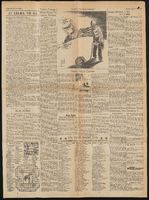Search the Special Collections and Archives Portal
Search Results

Meeting minutes for Consolidated Student Senate, University of Nevada, Las Vegas, March 08, 2004
Date
Archival Collection
Description
Text
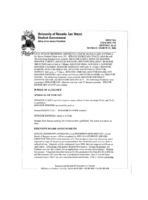
Meeting minutes for Consolidated Student Senate, University of Nevada, Las Vegas, March 22, 2004
Date
Archival Collection
Description
Text
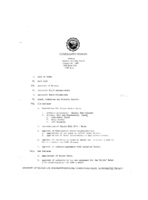
Meeting minutes for Consolidated Student Senate University of Nevada, Las Vegas, January 10, 1985
Date
Archival Collection
Description
Text

Meeting minutes for Consolidated Student Senate University of Nevada, Las Vegas, October 11, 1990
Date
Archival Collection
Description
Text
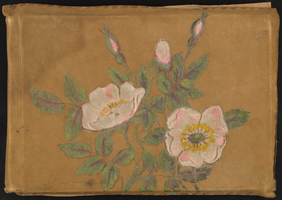
Scrapbook of poetry and other clippings
Date
Archival Collection
Description
Scrapbook of poetry and other clippings
Mixed Content

Transcript of interview with Virginia Beckly Richardson by Claytee D. White and Carole C. Terry, November 5, 2009
Date
Archival Collection
Description
Through her oral interview and the materials she provided, Virginia Beckley Richardson gives us a unique and fascinating look at both a pioneer family of Las Vegas and the early activities of the Service League, the forerunner of the Junior League of Las Vegas. Her personal recollections are an insight into life in the city's early years, and the biography of her father written by her brother, Bruce, humanizes a prominent figure in Las Vegas' history. The newspaper articles she made available enhance her descriptions of the Service League's activities. In addition, the article, "Merchant's Home Becomes Monument," describes her family home originally located on Fourth Street and relocated by the Junior League of Las Vegas in 1979. Her recollections clearly demonstrate her enthusiasm about her family's accomplishments and her involvement in the Service League
Text
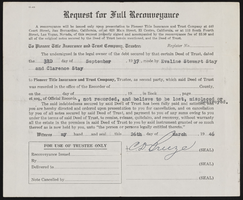
Evaline Stewart Stay estate legal documents and notes
Date
Archival Collection
Description
Evaline Stewart Stay estate legal documents and notes
Text

Charles Scott Emerson oral history interview: transcript
Date
Archival Collection
Description
Oral history interview with Charles Scott Emerson conducted by Claytee D. White on December 21, 2017 for the Remembering 1 October Oral History Project. In this interview, Charles Scott Emerson discusses his work with the American Red Cross and the disaster relief the organization provided during the aftermath of the October 2017 mass shooting in Las Vegas, Nevada. The interview begins with a discussion on Emerson's early life and career in Missouri and how he moved to Las Vegas in 2004. Emerson talks about the American Red Cross response plans and coordinated operations that are in place for when the community is faced with a disaster, going into specific detail on the community-wide response to the October 1, 2017 shooting. He gives a behind-the-scenes glimpse into how relief work is organized, using this interview as a chance to praise the hidden heroes of the October 2017 tragedy, including the people at the Family Assistance Center, the Attorney General's Office, the Driver's License Bureau, and the Coroner's Office, as well as mental health providers, child care workers, blood donors, and more. Throughout the interview, Emerson puts special emphasis on the importance of community in order to offer support in the aftermath of a tragedy as well as to prevent a man-made tragedy from occurring again.
Text


